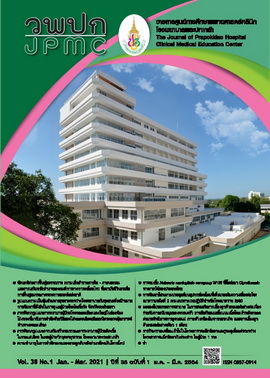A Hospital - Community Engagement Model Targeting Sustainability Development Goal in Chronic Kidney Disease Patients Care, Chachoengsao Province
Main Article Content
Abstract
BACKGROUND: Chronic kidney disease is a common health problem leading to premature death and high cost of treatment. Developing a hospital - community engagement model will delay the progress of kidney degeneration and decrease the rate of unplanned dialysis.
OBJECTIVES: To study and evaluate the achievement of the hospital - community engagement model in delaying chronic kidney disease.
METHODS: This descriptive study utilized data collected during 2016 - 2019. The sample was comprised of 20 health care providers, health center data on patients with chronic kidney disease, unplanned dialysis data record, clinical tracer, and health service system report. Participants were selected using purposive sampling; the research instrument composed of a 20 - item questionnaire and semi - structured interview guide. The data were analyzed using descriptive statistics and content analysis.
RESULTS: The findings from this study are as follows: the hospital - community engagement model was designed in context with the needs of the hospital; promoting the ability to perform self - management; building a partnership of care; exchanging health information and supporting the decision making of the patient and caregiver; increasing the rate of delay in the progression of kidney degeneration from 62.3% in 2016 to 66.1% in 2019; and decreasing the rate of unplanned dialysis from 35.4% in 2016 to 23.5% in 2019.
CONCLUSIONS: Development and implementation of a hospital - community engagement model can lead to sustainability of delay in progression of kidney degeneration in chronic kidney disease care.
Article Details
References
Aroonsrimorakot S, Vajaradul Y. UN Sustainable development goals: 17 aspects for future world. Journal of Thai Interdisciplinary Research 2016; 11(3):1–7.
Luyckx VA, Tonelli M, Stanifer JW. The global burden of kidney disease and the sustainable development goals. Bull World Health Organ 2018;96(6):414-422D.
Stibbe D, Reid S, Gilbert J. Maximising the impact of partnerships for the SDGs : a practical guide to partnership value creation. The Partnering Initiative and United Nations Department of Economic and Social Affairs [Internet]. 2018 [cited 2020 June 3]. Available from: https://sustainabledevelopment.un.org/content/documents/2564Maximising_the_impact_of_partnerships_for_the_SDGs.pdf.
Engagement Thailand. Socially-engaged scholarship. [Internet]. 2016 [cited 2020 April 10 2020]. Available from: http://www.knit.or.th/web/wp-content/uploads/2018/03/50EnTcaseThai.pdf.
Senaratne S. Dengue outbreak and management of control measures in the national hospital of Sri Lanka. Sri Lanka Journal of Medical Administration 2011; 13, 21-2.
Huang KY, Kwon SC, Cheng S, Kamboukos D, Shelley D, Brotman LM, et al. Unpacking partnership, engagement, and collaboration to inform implementation strategies development: theoretical frameworks and emerging methodologies. Front. Public Health [Internet]. 2018 [cited 2020 May 22]; 6:190. Avaliable from: https://www.frontiersin.org/article/10.3389/fpubh.2018.00190/full
Sutheeraprasert P, Kankarn W. The effectiveness of encourage family and village health volunteers participation program to delayed the progression of chronic kidney disease in urban area of Khon Kaen province. Journal of Nursing and Health Care 2018; 36(4), 42-51.
Chaiyasung P, Meetong P. Factors predicting chronic kidney disease of patients with chronic disease in the community. J Prapokklao Hosp Clin Med Educat Center 2018; 35: 128-39.
Arxer SL, Murphy JW. Community-based health interventions in an institutional context. Cham, Switzerland: Springer Nature Switzerland ; 2019.

